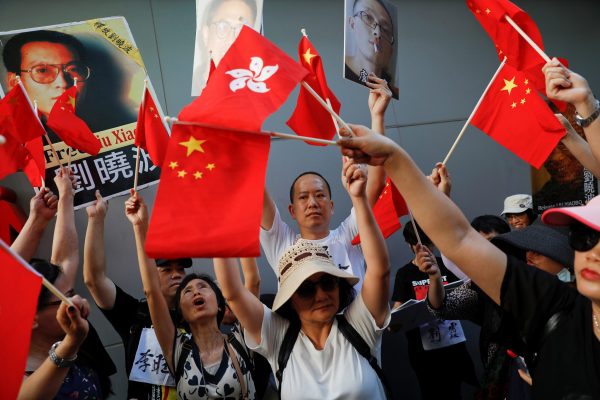Mallet’s visa denial comes amid renewed warnings from the Chinese government against foreign intervention in China’s internal affairs. In recent years, this anti-foreign intervention mantra has been extended to Hong Kong’s internal politics to discredit and undermine any calls for liberal democracy. Beijing’s goal is to frame Hong Kong supporters of democracy — and more recently of independence — as manipulated by the West, and to portray locals as otherwise willing submitters to Chinese rule.
In this context, Mallet’s visa denial can be seen as a warning to other journalists of the consequences of discussing Hong Kong independence. The topic has become a red line that cannot be crossed. That the Hong Kong National Party was small and had no concrete plans to implement their ideas seems to be irrelevant.
The Hong Kong government has been more guarded than Beijing in its response to the Mallet case, keeping the reasons for visa and entry denials ambiguous. Mallet himself did not even receive an official explanation. Chief Executive Carrie Lam only hinted indirectly at the reason when she stated that she will not allow advocacy of Hong Kong independence.
The Hong Kong government’s cautious approach is likely an attempt to avert potential criticism from the Western countries that its economy depends on. If countries like the United States were to remove Hong Kong’s preferential status — under agreements such as the United States–Hong Kong Policy Act — there could be serious economic consequences for the city.
China also profits from such arrangements, which allow easier access to markets in the West and facilitate investment flows into China. This access has become increasingly important in the ongoing US–China trade war, as Hong Kong allows China a way to partially circumvent US tariffs. Beijing must attempt to maintain a precarious balance between keeping up Hong Kong’s investment appeal for Western markets and restricting potentially subversive foreign political actors.
Mallet is certainly not the first person to face problems due to alleged ‘political interference’. In October 2017, British human rights activist Benedict Rogers was denied entry into Hong Kong. The British government demanded an ‘urgent explanation’ but the Hong Kong government again refused to comment on the case. And in August 2018, City Councillor Kenichiro Wada from Japan’s Chiba Prefecture was detained by immigration officials and denied entry because he had openly shown support a few months earlier for Au Nok-hin, a pan-democratic candidate in Hong Kong’s 2018 Legislative Council by-election. While the Hong Kong government did not comment, China’s Foreign Ministry asserted that: ‘China is firmly against interference in Hong Kong’s affairs by any foreign government, institution or individual in whatever way. This red line shall not be crossed’.
Foreign intervention concerns have a long history in Hong Kong. Following the 4 June 1989 massacre in Beijing, the Chinese government inserted Article 23 into Hong Kong’s Basic Law, which requires that the special administrative region enact laws to prohibit foreign or local political organisations from conducting political activities in the region. But the attempted legislation of this article in 2003 was met with a massive protest movement involving a rally of over 500,000 people. In response, the law was shelved. Recently government officials have raised the issue again, claiming that the law is needed to deal with Hong Kong’s growing independence movement.
Increasingly frequent visa and entry denials raise serious questions about Hong Kong’s rule of law and the ‘one country, two systems’ framework that is supposed to give the territory a high degree of autonomy until 2047. These seemingly arbitrary decisions highlight the continuing decline of political and civic freedoms in Hong Kong and are prompting calls for a re-evaluation of Hong Kong’s special position in the international system.
While pro-Beijing forces are pressuring the Hong Kong government to bring Article 23 back on the agenda in the coming legislative year, Carrie Lam has expressed a more cautious approach. Her priority at the moment is to avoid highly charged political controversies and instead focus on social policies, particularly housing.
The Hong Kong government is likely to continue to follow Beijing’s orders and deny access to ‘interfering’ foreigners for the foreseeable future. There is also little chance of the government taking any responsibility for these actions so that it can maintain good economic relations with the West. This is the new norm under ‘one country, two systems’.
Stephan Ortmann is Assistant Professor in the Department of Asian and International Studies, City University of Hong Kong.

